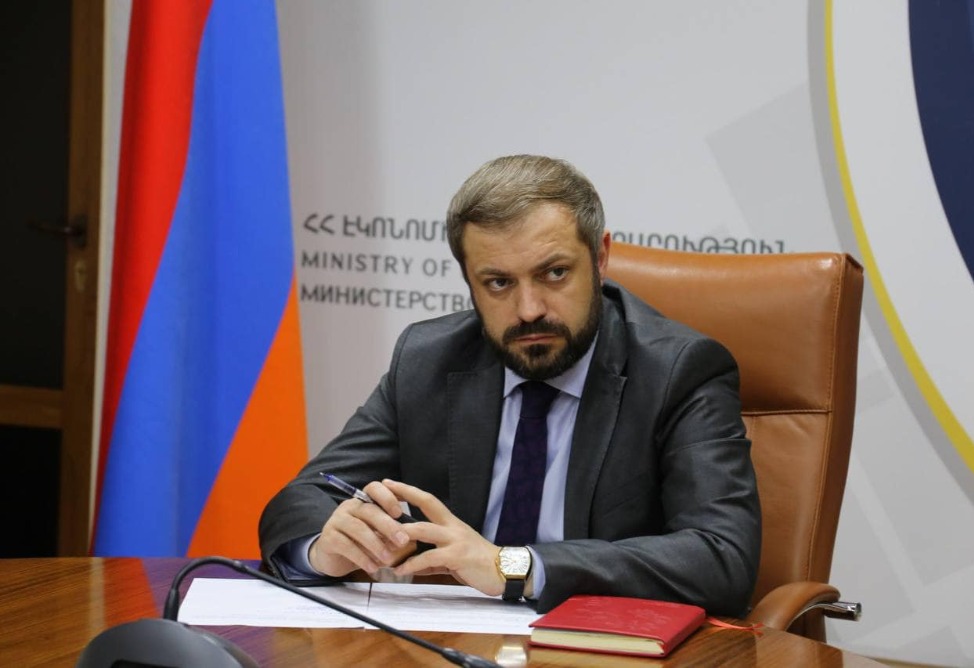Armenia’s stance on Armenian-Turkish protocols remain unchanged
15.12.2017,
11:22
The stance taken by Armenia on normalization of relations with Turkey remains unchanged, Tigran Balayan, the Armenian foreign ministry spokesman, told Novosti-Armenia on Thursday.

YEREVAN, December 15. /ARKA/. The stance taken by Armenia on normalization of relations with Turkey remains unchanged, Tigran Balayan, the Armenian foreign ministry spokesman, told Novosti-Armenia on Thursday.
Edward Nalbandian, Armenian foreign minister, speaking Wednesday in Greece as part of his official visit, said that Armenia’s 2018 spring will begin without Armenian-Turkish protocols, since Ankara put forward groundless preconditions that contradict these protocols’ essence.
In response, Turkey’s foreign ministry issued a statement saying that Turkey remains stuck to the protocols and Armenia’s statement doesn’t reflect the reality and is aimed at deluding the international community.
“On the last occasion we have voiced our attitude to Armenia-Turkey protocols during the speech of Edward Nalbandian in Athens two days earlier, and it remains in force,” Balayan said. “As for other issues, particularly Karabakh problem, Turkey has nothing to do in this process. The farther Turkey stays from this process, the better for it itself.”
Turkey and Armenia have no diplomatic relations; the border between the two countries was closed in 1993 by Ankara in solidarity with Azerbaijan.
Relations between Armenia and Turkey remain tense because of Ankara’s biased stance on Karabakh problem and its painful reaction to Armenia’s efforts to obtain worldwide recognition of the fact of Armenian Genocide.
The thaw in relations between the two countries began from Turkish President Abdullah Gul’s visit to Yerevan on September 6, 2008. He came to Armenia at his Armenian counterpart Serzh Sargsyan’s invitation to attend a 2010 World Cup qualifier in Yerevan between Armenian and Turkish national teams.
In 2009 October 10 Armenia and Turkey signed "Protocol on the Establishment of Diplomatic Relations" and the "Protocol on the Development of Bilateral Relations" in Zurich which were to be ratified by the parliaments of both countries.
However, on 22 April 2010, the president of Armenia signed a decree suspending the ratification of the protocols, stating that Turkey was not ready to continue the process, since it became known that the protocols had been automatically removed from the Turkish parliament’s agenda.
Karabakh conflict broke out in 1988 when Karabakh, mainly populated by Armenians, declared its independence from Azerbaijan.
On December 10, 1991, a few days after the collapse of the Soviet Union, a referendum took place in Nagorno-Karabakh, and the majority of the population (99.89%) voted for secession from Azerbaijan.
Afterwards, large-scale military operations began. As a result, Azerbaijan lost control over Nagorno-Karabakh and the seven regions adjacent to it.
Some 30,000 people were killed in this war and about one million people fled their homes.
On May 12, 1994, the Bishkek cease-fire agreement put an end to the military operations.
Тalks brokered by OSCE Minsk Group are being held over peaceful settlement of the conflict. The group is co-chaired by USA, Russia and France. --0-----
Edward Nalbandian, Armenian foreign minister, speaking Wednesday in Greece as part of his official visit, said that Armenia’s 2018 spring will begin without Armenian-Turkish protocols, since Ankara put forward groundless preconditions that contradict these protocols’ essence.
In response, Turkey’s foreign ministry issued a statement saying that Turkey remains stuck to the protocols and Armenia’s statement doesn’t reflect the reality and is aimed at deluding the international community.
“On the last occasion we have voiced our attitude to Armenia-Turkey protocols during the speech of Edward Nalbandian in Athens two days earlier, and it remains in force,” Balayan said. “As for other issues, particularly Karabakh problem, Turkey has nothing to do in this process. The farther Turkey stays from this process, the better for it itself.”
Turkey and Armenia have no diplomatic relations; the border between the two countries was closed in 1993 by Ankara in solidarity with Azerbaijan.
Relations between Armenia and Turkey remain tense because of Ankara’s biased stance on Karabakh problem and its painful reaction to Armenia’s efforts to obtain worldwide recognition of the fact of Armenian Genocide.
The thaw in relations between the two countries began from Turkish President Abdullah Gul’s visit to Yerevan on September 6, 2008. He came to Armenia at his Armenian counterpart Serzh Sargsyan’s invitation to attend a 2010 World Cup qualifier in Yerevan between Armenian and Turkish national teams.
In 2009 October 10 Armenia and Turkey signed "Protocol on the Establishment of Diplomatic Relations" and the "Protocol on the Development of Bilateral Relations" in Zurich which were to be ratified by the parliaments of both countries.
However, on 22 April 2010, the president of Armenia signed a decree suspending the ratification of the protocols, stating that Turkey was not ready to continue the process, since it became known that the protocols had been automatically removed from the Turkish parliament’s agenda.
Karabakh conflict broke out in 1988 when Karabakh, mainly populated by Armenians, declared its independence from Azerbaijan.
On December 10, 1991, a few days after the collapse of the Soviet Union, a referendum took place in Nagorno-Karabakh, and the majority of the population (99.89%) voted for secession from Azerbaijan.
Afterwards, large-scale military operations began. As a result, Azerbaijan lost control over Nagorno-Karabakh and the seven regions adjacent to it.
Some 30,000 people were killed in this war and about one million people fled their homes.
On May 12, 1994, the Bishkek cease-fire agreement put an end to the military operations.
Тalks brokered by OSCE Minsk Group are being held over peaceful settlement of the conflict. The group is co-chaired by USA, Russia and France. --0-----



